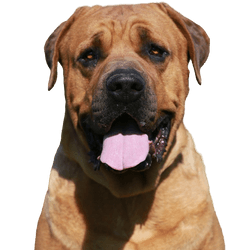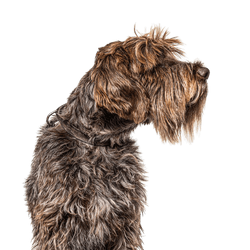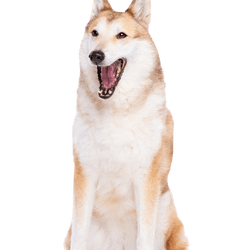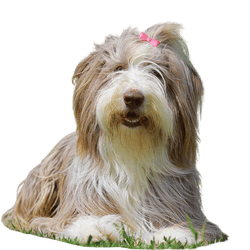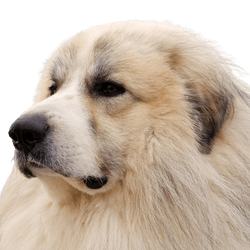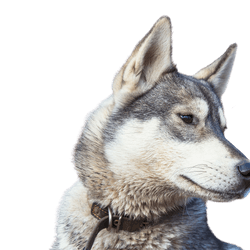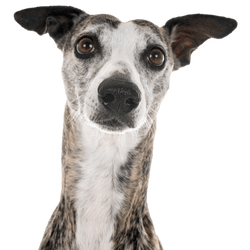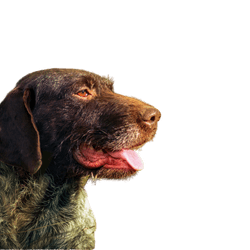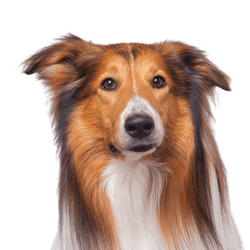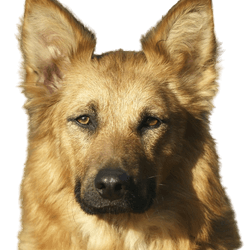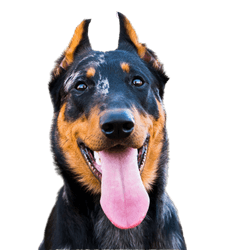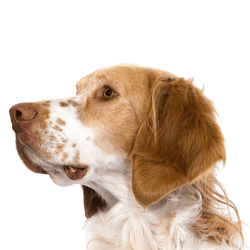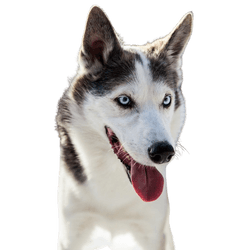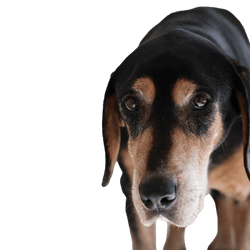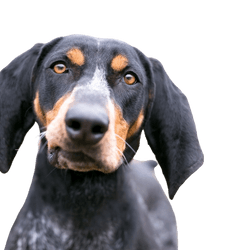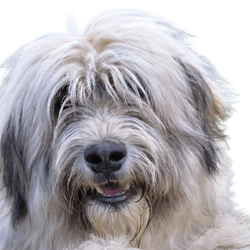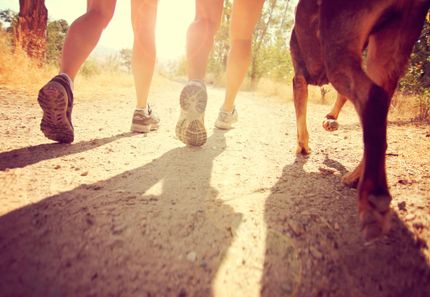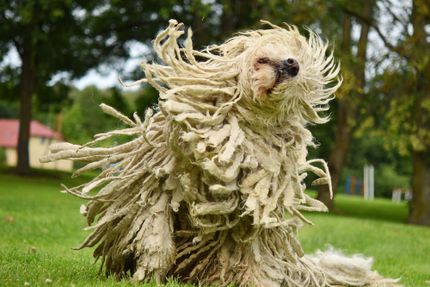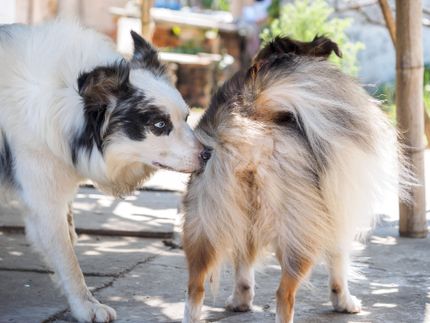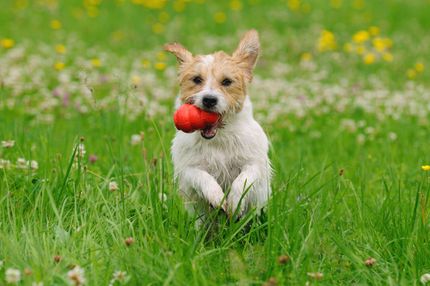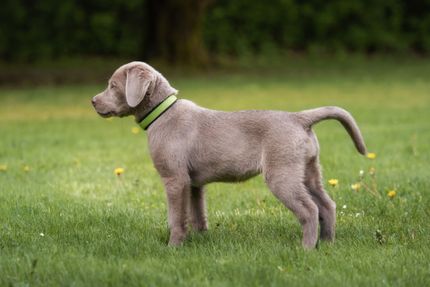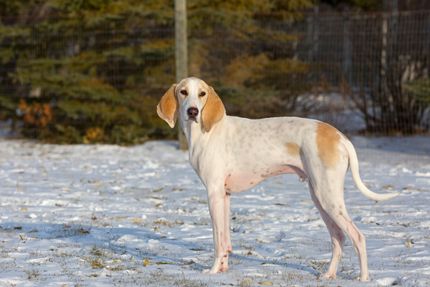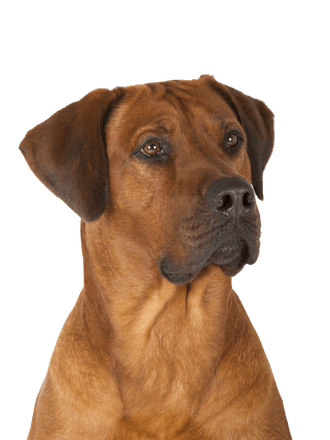
Rhodesian Ridgeback Breed description: Character & Co
Rhodesian Ridgeback
Facts & Origin
The Rhodesian Ridgeback is the only breeding dog originating from Africa. Their trademark is their distinctive eel-line on their back. Ridgebacks are courageous animals, that are very friendly towards people, but need a confident owner.
The origin of the Rhodesian Ridgeback
The Rhodesian Ridgeback type of breed began with semi-wild African dogs. They were kept by tribes in the south of Africa and were used for hunting and protection of the settlements. Later, the white settlers took over the Ridgeback and began breeding them systematically.
In order to preserve the long, slender build of today's type, they probably crossed them with various European hunting dogs.
In 1922 the British Francis Richard Barnes presented the breed standard for the first time in the colonial zone of South Rhodesia. Only a few years later, the African section of the Kennel Club officially recognised them as a new breed. In the meantime the Ridgeback spread all over the world.
The breed characteristics of the Rhodesian Ridgeback
To this day, these dogs have remained something original and wild. A Ridgeback radiates a confident kind of strength and at the same time a sense of calmness. They are the perfect guard and protection dogs, attentive, but never overly aggressive or eager to fight.
You will recognise this type of dog immediately by its elegant posture, their light to rusty-red coat and their distinctive markings on their backs. This line, called the "Ridge", which always runs against the direction of the coat, gave the animals their name and is also said to be the origin of their individuality.
Other things you should know about the Rhodesian Ridgeback
Unfortunately, this type of dog also became the target of dubious keepers at some point. Their muscular appearance and the eel-markings were considered chic by questionable owners. Therefore they ended up being listed as a dangerous breed in Bavaria for several years. In the meantime, the Ridge has been rehabilitated nationwide and the keeping of them is allowed everywhere again.
This is very similar in Switzerland. Only in the canton of Glarus the keeping of them needs to be permitted.
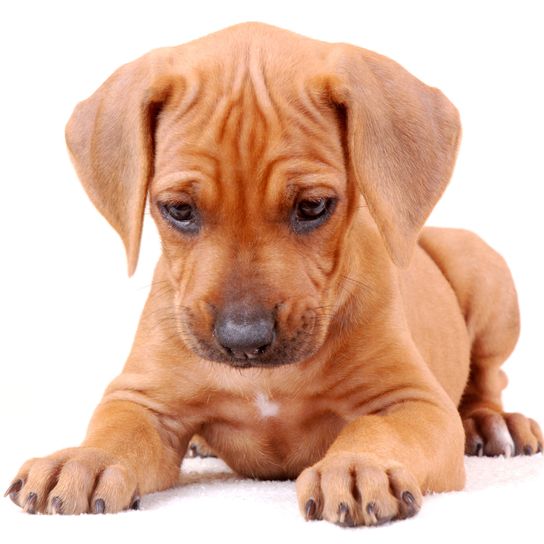
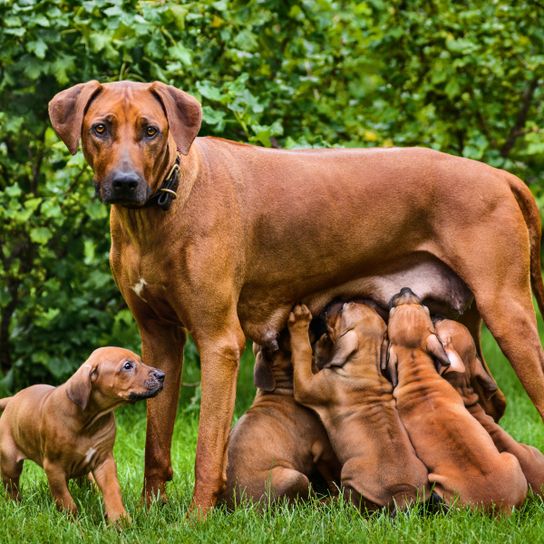
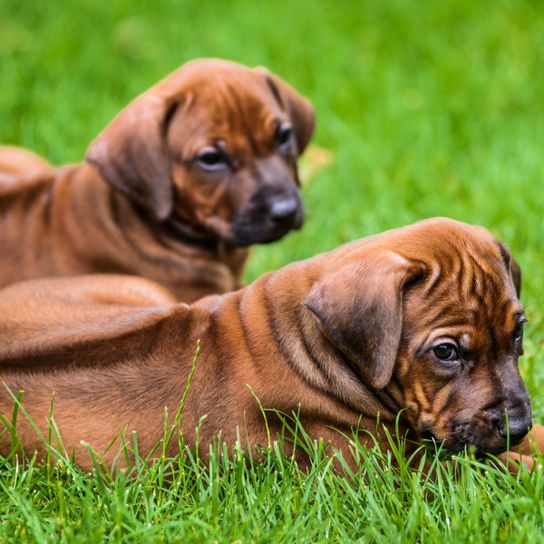
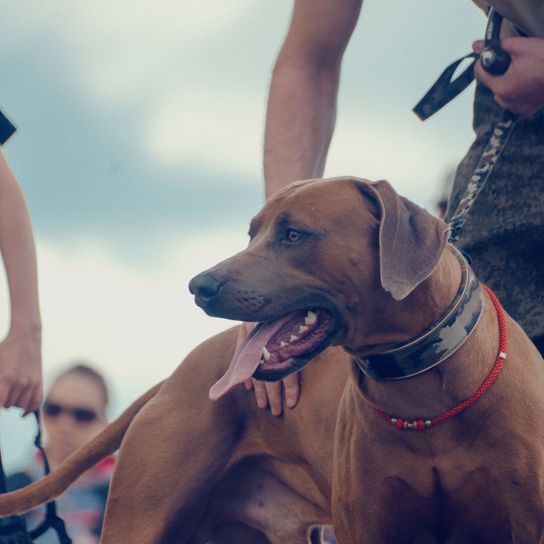
| Alternate Name | - |
| Origin | South Africa |
| Life expectancy | 10 - 12 years |
| Care requirements | low-maintenance |
| Activity level | average to high |
| FCI group | Related breeds |
| AKC group | Hound Group |
| KC group | Hound Group |
Rhodesian Ridgeback mixes
Attitude, character and temperament of the breed
The typical character traits of the Rhodesian Ridgeback
The Rhodesian Ridgeback is a courageous animal. They want to move, protect or do some sort of activity. Their temperament is persistent but not inexhaustible.
If you provide this dog with enough exercise, they will be a happy and well-behaved family dog or cuddle buddy in return.
They can form an intensive bond with a single person. Nevertheless, these dogs will always have a mind of their own and under certain circumstances, they will make sure they get their will.
An equally as stubborn owner will certainly be happy with a Ridge.
Running, cycling, hunting, tracking, agility or dogdancing are ideal as demanding activities.
- courageous, alert and active
- needs sporty activities
- sometimes stubborn
- persistent but within limits
- with enough exercise also suitable as family dog
Character
Usage
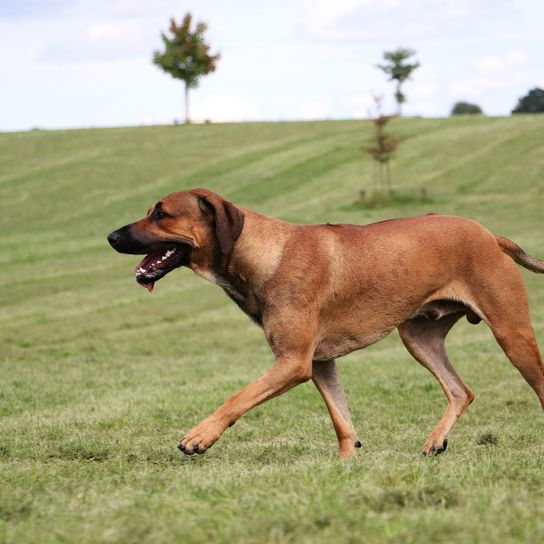
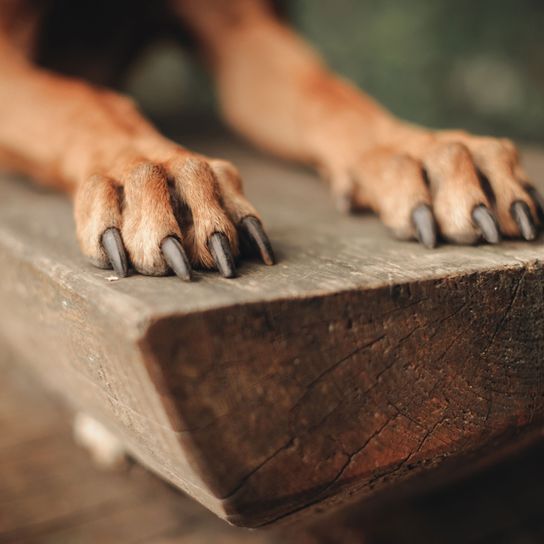
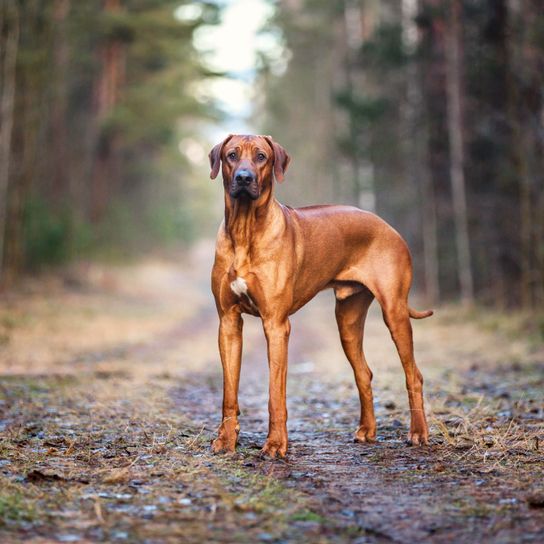

Health and breeding information
Breed typical diseases of the Rhodesian Ridgeback
As the only typical disease of the breed, Symmetrical Lupoid Onychodystrophy appears more frequent in Ridgeback dogs. This mysterious autoimmune disease causes pain in the paws and toes. In the worst case, their claws can fall off and only grow back in reduced way. Hypothyroidism and the nerve disease Wobbler Syndrome can occur, but are rather rare.
- Symmetrical Lupoid Onychodystrophy (SLO)
- Hypothyroidism
- Wobbler syndrome
Rhodesian Ridgeback breeding and acquisition
Before you invite a Ridgback puppy into your household, you have to think carefully about whether you can do this agile dog justice.
In old age, the Ridges, like many other large breeds, might have to deal with joint problems and arthosis. If you live on the third floor of an apartment building without an elevator, you will have a problem. A house with a garden in the countryside and lots of exercise is perfect.
Because of its rarity and peculiarity these dogs are expensive. For a Ridgeback puppy you will have to pay at least 1200 to 2000 Euros. Good breeders will provide you with comprehensive information and advice on nutrition and appropriate keeping of your puppy.
Further information about the Rhodesian Ridgeback breed can be obtained from the German Rhodesian Ridgeback Breeders' Association.
Buying a Rhodesian Ridgeback may not even be necessary! Clubs such as Ridgeback in Not constantly have somewhat older and yet lovable four-legged friends in need. Here you only pay a small nominal fee for a great dog and you will certainly receive a grateful soul for free in return.


Appearance and coat of the Rhodesian Ridgeback
The Ridgeback is a muscular, athletic dog. Typical for them are the extremely broad chest, the wiry build and large ears. Their brown, warm eyes provide an irresistibly faithful look. Their legs are long and solidly built. Altogether the Ridge has a very harmonious and sweeping physique.
The eel-line or "ridge" starts behind the shoulder blades in a unique point, fan or swirl. It tapers towards the back of their body. The breed standard sees only very specific shapes as fit.
The coat of these extremely beautiful animals is short and easy to take care of. The Ridgeback hardly sheds hair. The top colour is always brown, white sections are only rarely found in the area of the paws, on the chest, on the hindquarters or in older animals. Colours range from a light golden shimmering brown to rusty red or fox red. If the dog is in motion, the coat pattern shows a beautiful play of colours, especially in bright sunlight.
- muscular, athletic physique
- short coat, sheds little
- always in different warm, reddish brown tones
Size, weight and life expectancy of the Rhodesian Ridgeback
The Ridgeback is considered a large dog with its weight being moderate compared to their shoulder height. Their shoulder height always reaches over 60 cm in the adult animal, but the weight remains mostly less than 40 kg.
- Males 63 to 69 cm
- Males 36 to 40 kg
- Bitches 61 to 66 cm
- Bitches from 32 to 37 kg
- Life expectancy between 10 and 12 years
| Fur length | short |
| Fur | - |
| Ear shape | Triangle |
| Tail | lang |
| Anatomy | muscular, strong |
| Size ♀ | 61 - 66 cm |
| Weight ♀ | 29 - 34 kg |
| Size ♂ | 63 - 69 cm |
| Weight ♂ | 36 - 41 kg |
| Suitable For | - |
Colors
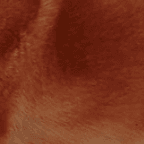

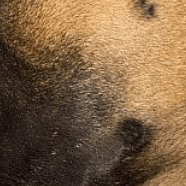



Known Diseases
Elbow dysplasia (ED)
Elbow joint dysplasia is a chronic disease complex of the elbow joint of fast growing dog breeds.
Hip dysplasia (HD)
The hip dysplasia or hip joint dysplasia of the dog (HD) is a maldevelopment of the hip joint.
Ataxia
Ataxia (from Greek ἀταξία ataxia 'disorder' 'irregularity') is a generic term in medicine for various disorders of movement coordination. Ataxia can occur even when there is no paralysis (paresis), that is, when there is normal muscle strength.
FAQ
-
He can basically be kept as a family dog, but does not necessarily need children in his life. This must be tested and practiced through training and tolerance training.
-
The Ridgeback is considered a listed dog in Switzerland but not in Austria (exception: Vorarlberg) and Germany.
-
It's best to read our breed description carefully and consider whether your lifestyle suits this animal.
-
The South African Ridgeback is not considered a dangerous breed. However, due to its bite strength, it is on the list of dangerous dog breeds in Switzerland in some cantons and also in Vorarlberg, Austria.
Sources and relevant links
Offizielle Seite des FCI
Gabriele Lehari (2004). Ulmers Großes Lexikon der Hunderassen. Ulmer.
VDH.de
Accessed on 25.01.2023
Rhodesian Ridgeback Club Österreich
Accessed on 25.01.2023
Other large dogs
Useful Articles
You can find articles that might interest you in the dogbible blog to match your favorite breed.
Visit our magazineto stay up to date on dog trends.
To find out more, view our Privacy Policy
Find here the breed that suits you and find out what character traits it has. Here you can also learn more about the origin, size and weight of your favorite breeds.
Matching your favorite breed, you'll find articles that might interest you on the dogbible dog blog.
Biting power in dogs: These 7 breeds have the most power
14 foods that are toxic for dogs
How to introduce dogs and cats - With these 3 tips it succeeds



